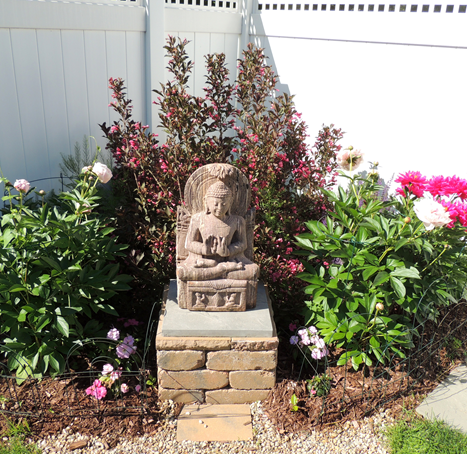The Daily Escape:

Zen Garden, Fields of Wrong, CT – 2015 photo by Wrongo
Some of Wrongo’s readers also follow Heather Cox Richardson, a Boston College history professor who writes an extremely successful blog called “Letters from an American“. She has the gift of seamlessly moving from speaking about America’s history to today’s politics. Last week, she had a column that Wrongo thinks everyone should read.
In it, she gives us a quick review of what led up to the Voting Rights Act of 1965. Here is a long quote:
“Fifty-six years ago today, on August 6, 1965, President Lyndon B. Johnson signed the Voting Rights Act. The need for the law was explained in its full title: “An Act to enforce the fifteenth amendment to the Constitution, and for other purposes.”
In the wake of the Civil War, Americans tried to create a new nation in which the law treated Black men and white men as equals. In 1865, they ratified the Thirteenth Amendment to the Constitution, outlawing enslavement except as punishment for crimes. In 1868, they adjusted the Constitution again, guaranteeing that anyone born or naturalized in the United States—except certain Indigenous Americans—was a citizen, opening up the suffrage to Black men. In 1870, after Georgia legislators expelled their newly seated Black colleagues, Americans defended the right of Black men to vote by adding that right to the Constitution.
All three of those amendments—the Thirteenth, Fourteenth, and Fifteenth—gave Congress the power to enforce them. In 1870, Congress established the Department of Justice to do just that. Reactionary white southerners had been using state laws, and the unwillingness of state judges and juries to protect Black Americans from white gangs and cheating employers, to keep Black people subservient. White men organized as the Ku Klux Klan to terrorize Black men and to keep them and their white allies from voting to change that system. In 1870, the federal government stepped in to protect Black rights and prosecute members of the Ku Klux Klan.
With federal power now behind the Constitutional protection of equality, threatening jail for those who violated the law, white opponents of Black voting changed their argument against it.
In 1871, they began to say that they had no problem with Black men voting on racial grounds; their objection to Black voting was that Black men, just out of enslavement, were poor and uneducated. They were voting for lawmakers who promised them public services like roads and schools, and which could only be paid for with tax levies.
The idea that Black voters were socialists—they actually used that term in 1871—meant that white northerners who had fought to replace the hierarchical society of the Old South with a society based on equality began to change their tune. They looked the other way as white men kept Black men from voting, first with terrorism and then with state election laws using grandfather clauses, which cut out Black men without mentioning race by permitting a man to vote if his grandfather had; literacy tests in which white registrars got to decide who passed; poll taxes; and so on. States also cut up districts unevenly to favor the Democrats, who ran an all-white, segregationist party. By 1880 the south was solidly Democratic, and it would remain so until 1964.”
Cox Richardson talks about how a debate raged over whether states or the federal government should control who is allowed to vote in elections. That eventually led to LBJ signing the Act.
She then brings us back to the John Roberts Supreme Court gutting most of the provisions of the Act. First, with the 2013 Shelby County v. Holder decision, and in July, with their decision in Brnovich v. DNC. In the wake of the 2020 election, Republican-dominated states have increased the rate of voter suppression, and the Brnovich decision helps codify their moves. Read the whole thing.
So once again, America faces an existential crisis over voting rights and whether it is the states, or the federal government, that should decide who can vote in our elections. As Wrongo has reported, a recent Pew poll shows that more than two-thirds of Republican voters don’t think voting is a right and believe it can be limited.
There’s still some hope that a voting rights bill can pass before the 2022 mid-terms. That could restore the power of the federal government over the states to enforce them.
Time to wake up America! Without federal oversight of voting, America will slip back into voter suppression. We can easily return to an earlier time that denied voting rights to many Americans.
To help you wake up, listen to Son Volt’s song “Living in the USA” from their new album, “Electro Melodier”. Front man Jay Farrar wonders if we’ve misplaced our collective soul, and how we glue the pieces of a broken country back together:
Sample Lyric:
This land of freedom, all can live the dream they say
With voices crying out and sirens wailing away
Money flows through every back channel door
Cash crowns the king, there’s no limits anymore
Livin’ in the USA

Excellent!! As usual, you have things exactly correct. I read ever day, and frequently repost. Thanks for the great work!